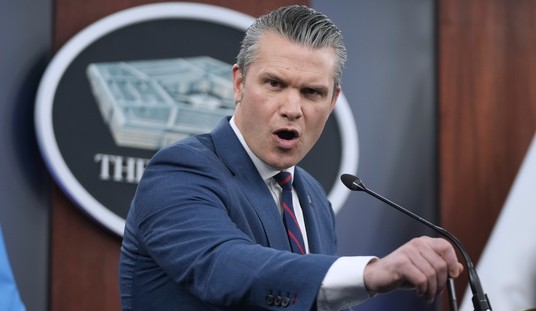Things get going at 26:55 below but stick with it until she starts riffing on the Kenyan presidential election that was overturned. Challenging the legitimacy of the election has been her chief occupation in U.S. politics since November 8th, although until now that challenge has been framed in moral terms, not legal ones. Comey stabbed her in the back by sending that letter in late October; Bernie stabbed her in the back by not campaigning harder for her; the voters stabbed her in the back for preferring a boorish alpha male to a forward-thinking feminist; and Russia stabbed her in the front by allegedly colluding with Team Trump to turn voters against her. That’s the Hillary anthem, now and forever more. Twenty years from now she’ll still be wheezing her way through her theory of how Comey cost her the election, like the Stones playing “Satisfaction.” Gotta play the hits.
What’s novel about this NPR exchange is that she’s no longer questioning just the morality of her defeat. She holds out the possibility of questioning the legality of it — a small possibility, as she’s properly skeptical that there’s any way to do that under the U.S. Constitution. But others disagree, she’s careful to note:
What would be the means to challenge it, if you thought it should be challenged?
Basically I don’t believe there are. There are scholars, academics, who have arguments that it would be, but I don’t think they’re on strong ground. But people are making those arguments. I just don’t think we have a mechanism. You know, the Kenya election was just overturned and really what’s interesting about that — and I hope somebody writes about it, Terry — the Kenyan election was also a project of Cambridge Analytica, the data company owned by the Mercer family that was instrumental in the Brexit vote.
There’s now an investigation going on in the U.K., because of the use of data and the weaponization of information. They were involved in the Trump campaign after he got the nomination, and I think that part of what happened is Mercer said to Trump, We’ll help you, but you have to take Bannon as your campaign chief. You’ve got to take Kellyanne Conway and these other people who are basically Mercer protégées.
And so we know that there was this connection. So what happened in Kenya, which I’m only beginning to delve into, is that the Supreme Court there said there are so many really unanswered and problematic questions, we’re going to throw the election out and re-do it. We have no such provision in our country. And usually we don’t need it.
Republicans are beginning to pile on:
I know Secretary Clinton is trying to sell books but this is wildly irresponsible and she should be ashamed. https://t.co/TL5KYhfwsn
— Cory Gardner (@SenCoryGardner) September 18, 2017
I can’t imagine what a legal challenge to a presidential election would look like. Even if you had solid evidence of out-and-out vote-rigging, which no one has claimed occurred last November, the only obvious constitutional remedy would be impeachment. That’d be easy if both houses of Congress were controlled by the opposition, less easy if they’re controlled by the president’s own party — although not insurmountable depending upon how solid the evidence of fraud was. Proof that the president himself conspired to change vote tallies would be an impeachment slam-dunk, one would think. That’s not something the GOP needs to worry about with Trump, but there are “gray area” possibilities that could force a tough call. What if, hypothetically, Paul Manafort colluded with Russia on the DNC and Podesta leaks somehow? Or what if Jared Kushner conspired with the Kremlin in targeting American voters with ads on Facebook? And what if Trump himself didn’t know that it was going on? To make it extra difficult, imagine that Russia intervened on Trump’s behalf in some *decisive* way because Putin concluded that a Trump presidency would be better for Russia than a Clinton presidency would, but neither Trump nor anyone on his team colluded with Russia in that effort or even knew about it. Is that grounds for impeachment? That’s basically what the GOP’s facing now, minus the important detail about Russia’s interference being decisive. (Does anyone think the DNC/Podesta stuff moved significant votes?) My hunch is congressional Republicans would say no, that impeachment is warranted only if the president willingly abetted criminal activity. If he merely benefited from it, unknowingly, we can’t punish him by taking his office away. A lot of Democrats would disagree with that, but that’s political reality.
Anyone want to try a legal theory for how the election could be challenged, i.e. in court rather than with impeachment in the House? You could try suing Trump for criminal fraud if there was evidence to suggest that he intentionally colluded with Russia, I guess. I’m … skeptical that a federal court would attempt to send the president to prison, but that’s one way to get him out of office. Ultimately, though, Russiagate is more likely to become a nightmare for the GOP than it is for Trump. If any proof of collusion emerges, even if it doesn’t quite rise to the level of impeachable offenses, the party will come under intense pressure from Democrats to recognize that Trump’s win was illegitimate by refusing to support legislation introduced by the White House. From now on, Schumer and Pelosi would say, the only laws that should pass until the end of Trump’s term are those that can carry two-thirds of both houses. Think McConnell and Ryan would go for that knowing how Republican voters would react?
Exit question: Did Comey cost Hillary the election? That’s the conventional wisdom among political media, led by Nate Silver. But maybe the conventional wisdom is wrong.








Join the conversation as a VIP Member